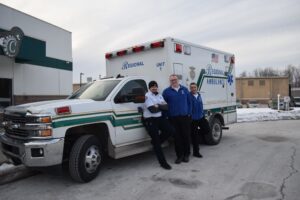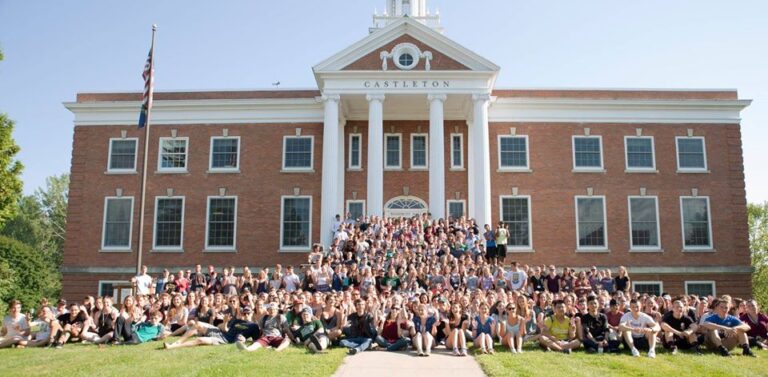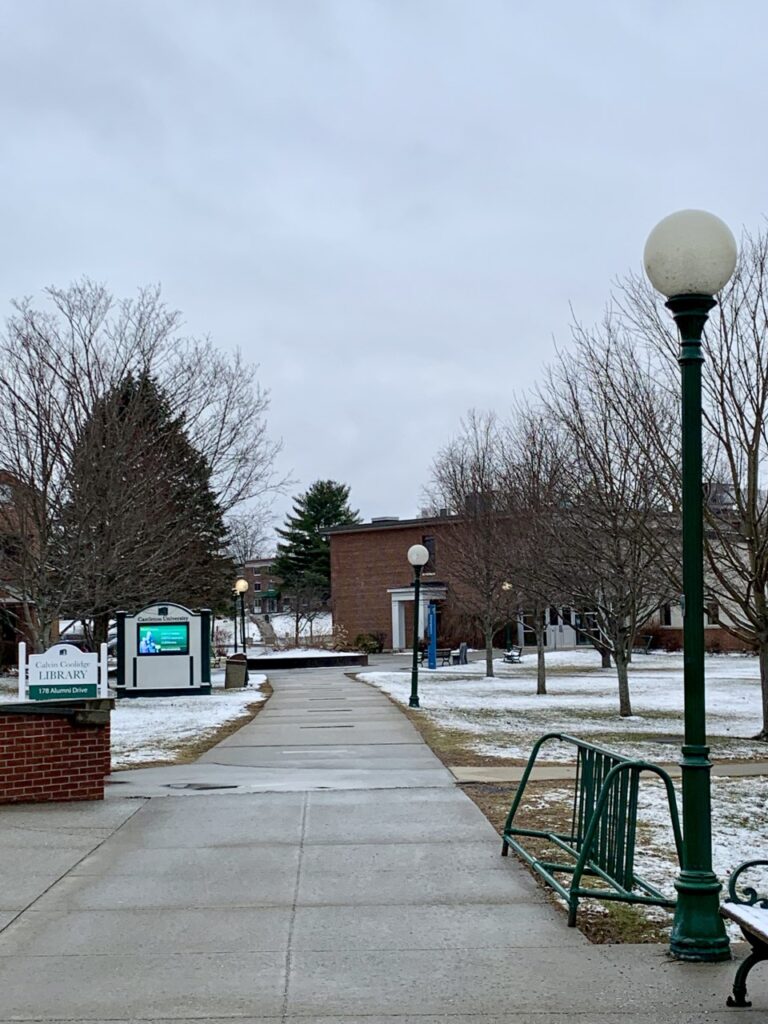Student EMT discusses COVID-19
It’s Saturday afternoon and Morgan Rainville and his fellow emergency medical technicians receive one of the 30 daily 9-1-1 calls dispatched to the Regional Ambulance Service in Rutland.
The EMTs gather more information about the caller and take fever, coughing, shortness of breath and other viral symptoms into account. New protocols force the Castleton University senior and his fellow crew members to wear N95 respirators and eye protection, as well as full gowns and gloves before riding off in one of seven 343 green-striped, cubical trucks to the caller’s location.
The personal protective equipment covers Rainville throughout the entire interaction with the patient. Only when it is time to drive the ambulance to the Rutland Regional Medical Center does one EMT strip down while the other continues to work with the patient.
They notify the hospital staff about the patient’s condition ahead of time, and once they arrive at the modified ambulance bay, staff members screen the patient before bringing them inside.
“It’s been a lot of extra steps to accomplish the same task, especially if it’s somebody with the flu. But, it’s all for a good reason, and it’s been very successful at keeping anyone from our work from getting contaminated or getting sick,” Rainville said.
With the spreading of COVID-19 across Vermont and the rest of the country comes extra precautions for EMTs like Rainville. Although the number of calls he receives rarely fluctuates, he puts in more effort to ensure that his work environment is always sanitary.
“I think my hands have probably become just about bone-dry and cracked from the amount of hand sanitizer and handwashing I’ve done in the last few days,” he said.
A desire to serve others
Rainville began his work in emergency services while in high school. At 16, the Highgate Center native helped out at his local volunteer fire department. This desire to serve others transitioned to his college years. During his sophomore year at Castleton, he enrolled in an EMT class hosted by the R.A.S.

After 60 hours of class time, a psycho-motor skills test and a written test, he completed his EMR training. The next step entailed double the class time as well as field training. With 180 hours, ambulance ride time, and more tests under his belt, Rainville became a certified EMT.
He took this training to the Fair Haven Rescue Squad before joining the R.A.S. in June 2019.
Michael Tarbell, deputy chief of Operations at the ambulance service, explained his admiration for Rainville’s compassion, flexibility and willingness to improve himself.
“He’s inquisitive. He asks questions for clarification if he doesn’t understand or is confused about why something went the way it went, and he’ll seek out those answers instead of accepting a face value, status quo type of response from people,” Tarbell said.
The ambulance service covers a large chunk of Rutland County, including Castleton. Some of the calls brought Rainville to the campus where he studies, but he said the cases were relatively mild; mostly students overindulging in alcohol.
“It’s nice because it’s a young population of relatively very healthy people,” he said.
A fine balance
Rainville said he tries to work four shifts a week. A typical schedule for him peaks on the weekend, with 12-hour shifts both on Saturday and Sunday. During the week, he takes two graveyard shifts; riding Tuesdays and Thursdays from 8 p.m. to 8 a.m.
“Usually, I end up (working) around 40-50 hours a week,” he said.
These shifts coincide with his academics and extracurriculars. The environmental science major has been involved in the track & field team, the Backcountry Hunters and Anglers Club, the club rugby team and he’s also a community advisor for Foley Hall. His CA duties continued even after the campus shut down.
Rainville admitted that the schedule initially pushed him to his limits and drove him to illness from time to time. As he persevered, he improved his time management, and tries to keep his work in order; fitting schoolwork in the minute amount of time between calls.
“It’s been a bit of a learning curve, I guess,” Rainville said.
The hectic schedule does not put a damper on Rainville’s academics, however, and his advisor, professor Andrew Vermilyea, spoke about his work ethic and attitude.
“I appreciate that he is always prepared,” Vermilyea said. “I feel like we can always have candid conversations.”
His interests in environmental science and emergency services are well known to Vermilyea. Though one passion might be of greater interest than another, Vermilyea said he sees the two working together.
“Troubleshooting, critical thinking, being able to work with others collaboratively as a team, and the fundamental science courses will serve him well in this role,” Vermilyea said.
Tarbell said he likes having local college students like Rainville on the R.A.S.’s staff because they’re a valuable resource. He explained the retention rate for student EMTs conserves time that would be relegated to constantly training new individuals.
“We can focus on people that are in school and know that they’re gonna probably come back the following two to three years or four years,” Tarbell said.
Lives on the line
The Vermont Department of Health stated that as of April 3, 389 patients in the state tested positive for COVID-19 and 17 patients have died. The health department confirmed 17 positive cases in Rutland County.
WPTZ reported that a clinical employee at Rutland Regional was one of the 389 cases.
Given the nature of his job, Rainville is aware of the risks. He said he has interacted with about three people who could have potentially been infected. However, he said he has never needed to be tested and his training gave him the ability to carefully handle patients in order to prevent the spread of infection.
Vermilyea is confident in his advisee’s abilities to minimize exposure. He invoked great admiration in Rainville’s selflessness as well.
“Our health care workers are in a tough spot right now where they are potentially putting themselves and families in danger to save others,” he said. “The work that Morgan and others are doing is about as noble as it can get.”
The R.A.S. has taken measures to protect its workers. It closed its building to the public and limited its entryways to the ambulance bays. Additionally, uniforms remain in the building and the staff continuously washes them in an effort to keep the virus out.
“The job’s not going to go away. We’re still going to have an obligation and a need to respond to calls,” Tarbell said. “And if our workforce gets compromised by the COVID virus, then we have a problem because we don’t have a good way of backfilling anybody at this point.”
Rainville discussed an illness that he recently overcame and was told that COVID-19 is not as severe. At the moment, his focus is to stay healthy and make sure he does not have any underlying respiratory issues, but he is not too worried about getting sick.
“If it happens, it happens, and then I’ll isolate myself for the next two weeks,” he said.
Aside from the precautions, it’s business as usual for the R.A.S. As the major ambulance service of Rutland County, its units continue to respond to non-COVID-19 related emergencies. Unfortunately, the staff says, the virus only adds stress to the unpredictable situations that the EMT’s and paramedics regularly face.
The bigger concern
Following other universities across the United States, Castleton closed its campus on March 13 and transitioned to online classes. With the escalating pandemic, this practice will remain in place for the rest of the spring semester. That day, Vermont Public Radio reported that Gov. Phil Scott issued a “Stay Home, Stay Safe” executive order, which is in effect until April 15.
For Rainville, managing the online situation is his biggest concern. Coming from the intimate atmosphere of a small university where students could form a relationship with their professors, he said it will be interesting to see members of the Castleton community adapt to the exact opposite.
“I know I have a lot of professors who are attempting to avoid using Zoom because they think it’s not going to work as well,” he said. “And so far, they’ve done a pretty decent job of being able to circumnavigate that and do everything without having to rely on that program.”
As a senior, the uncertainty about commencement also bothers him.
“I guess a lot of student plans have been put on hold because of this, and I would have to say mine is one of those as well,” he said.
After graduation, his plan was to train to become a paramedic. But the disease postponed further EMS training in all fields except basic EMT’s.
For now, the task at hand is to continue his duties and do everything in his power to save lives.
“If we deem (that) the patient is sick and there is a great risk to life, it does not matter if they are infected or what the deal is, they need to be transported,” Rainville said. “And we will do everything we can to make sure they are transported as quickly as possible.”








